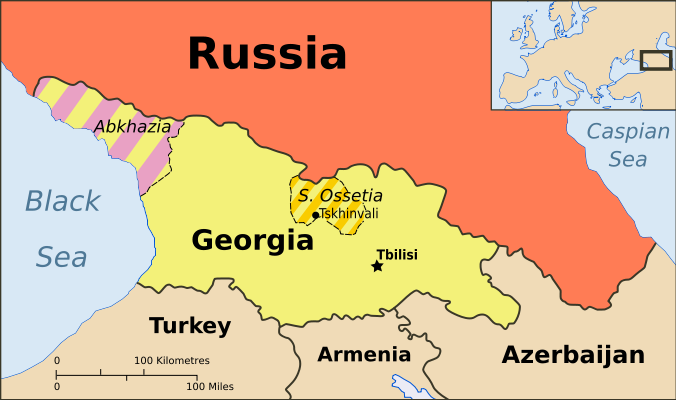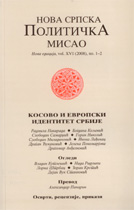| NSPM in English | |||
The Prospects of Functioning of Abkhazia and South Ossetia |
 |
 |
 |
| субота, 27. новембар 2010. | |
|
 Two years of Abkhazia and South Ossetia’s functioning as “independent” states did not change their status in a large extent. They still lack the international recognition by international community, and growing military presence confirms the theory of the strategic character of their existence. Two years of Abkhazia and South Ossetia’s functioning as “independent” states did not change their status in a large extent. They still lack the international recognition by international community, and growing military presence confirms the theory of the strategic character of their existence. The events of August, 2008, connected with Ruso-Georgian armed conflict, as well as its direct consequence – proclaiming the Abkhazian and South Ossetian states, have resulted in the establishment of the ”new-old” geopolitical order in Southern Caucasus region. The Moscow’s actions were a clear display of Kremlin’s power, and the supremacy of its interests in the regions of so-called “near neighbour states”. We should not forget, though, that the events of August 2008 did not appear out of nowwhere. The Ruso-Georgian conflict, but also Osetian-Georgian and Abkhazian-Georgian conflict have their long-lasting antecedences. What is more, we should remember about the influence of Western activities in Kosovo question on the Russian position. Undoubtedly, ignoring Kremlin during Serbian-Aalbanian conflict, as well as disregard of international law during the creation of the state of Kosovo, provoked the Russian actions during the conflict in Georgia. During the last two years, an order fixed by Moscow in de facto independent South Ossetia and Abkhazia have been petrified. The growing military presence on those territories is a clear message that they are becoming a kind of military garrisons that enable Moscow to efficiently play its geopolitical game on Caucasus. Economic collapse In the case of South Ossetia, as well as Abkhazia, in two years the economic situation slightly improved. Nevertheless, both para-states are still unable to exist independently. In both cases, Moscow strongly donates the state budget. [1]. The lack of economic infrastructure, as well as full control of local authorities excercised by Kremlin [2] prevent Tskhinvali and Sukhumi from developing an economic initiative, that has a chance to develop in future only in Abkhazia (which is very attractive for tourists). It means that economically both para-states are fully dependent on Moscow. From this point of view, the situation of South Ossetia appears much more difficult, which is unable to product its own goods because of the lack of infrastructure. The main branch of South Ossetian “economy” was agriculture, but after the conflict of August 2008 and escape of Georgian populace (which has,in large extent, supported Ossetian agriculture), this branch is now ineffective. On the territory of South Ossetia there is only one factory, which works more or less normally [3]. As a result of international isolation, the South Ossetian trade has been dominated by more than ninety per cent by Russian goods. The region remains ignored by foreign investors because f the tense political situation. That is why the Russian part is still the main investorin the region. Starting with August 2008, Kremlin invested about 840 million dollars in South Ossetia [4]. According to International Crisis Group, the average salary paid by the biggest South Ossetian employer in 2010 was around 240 dollars monthly. The situation in South Ossetian schools and hospitals, as well as in road and energetic infrastructure, which were largely destroyed during the recent conflict, is tragic. The situation in Abkhazia looks somewhat better, largely because of possilbilities of developement. In 2010, the rate of Russian capital in state budget largely decreased [5]. Similarly as in the case of South Ossetia, Russian Federation remains the only trade partner. On the contrary to Tskhinvali, Sukhumi products some amount of goods,that are produced on export. In the year 2008, the value of goods exported was 890 million rubles [6]. The access to the sea enabled Abkhazia to prform a small-scale international exchange with Turkey (export of lumber, import of oil) and Romania (import of oil) [7]. The buffer zone on the Abkhazian coast (patroled by Russian troops) makes international contacts more difficult. In Abkhazia big foreign investments are currently impossible, mostly because of the tense political situation. That is why Russians remain to be the only investor, who imposes numerous cocessions. on the government in Sukhumi. The tourist values of Abkhazia still create the possibilities of economic development of this branch of economy, which could have a real influence on local economy. Many people talk about possible integration of Abkhazia with “olympic zone” during Winter Olympic Games in 2014, which are due to take place in nearby Sochi. Again, the political situation may become a detering factor for potential tourists. Russian garrisons A two-year lasting ”experience” of functioning as a state of Abkhazia and South Ossetia does not leave any major doubts about the reason of creating those states and its convergence with the main political goals of Kremlin. According to the treaty of 2009, both para-states provided Moscow’s armed forces with an unlimited access to their territories [8]. From the strategic point of wiev, Abkhazia appears to be a Kremlin’s priority. According to the information provided by Russian and Abkhazian side, presently there are around 4000 Russian soldiers on the territory of Abkhazia [9]. Two military bases are the priority for Russia. The first one is Ochamichira – the naval base, the development of which was connected with the future of harbour in Sevastopol, which was unknown until the recent time. The other one is one of the biggest air force bases on Southern Caucasus – Bombora, located not far from Gudaty. The Russian military still fully control Abkhazian-Georgian border. Nothing appears to pose any considerable threat to the further presence of Russian army in Abkhazia. It is difficult not to agree with this statement considering the fact, that the main posts connected with the defence of the state are teken by Russians. According to International Crisis Group, Alexandr Pavlushko (the commander of Russian peacekeeping forces and unofficial defence minister of Abkhazia) and Anatoliy Zaytsev (former defence minister of Russian Federation, current chief of General Staff of Abkhazia) and Alxandr Vosinski (ex-KGB officer, current deputy of the secretary of National Security Council of Abkhazia) play the key roles in the area of Abkhazian defence and national security [10]. Considering almost full Russian control over Abkhazian national security sphere, one should not expect from Sukhumi any creativity in the field of defence. According to International Crisis Group, deep Russian infiltration of Abkhazian authorities make withdrawal of Russian army not probable in foreseeable future [11]. The plans of target size of Abkhazian army, which according to International Crisis Group should consist of only 1000 to 5000 soldiers [12]. That is why the Russian armed forces will take the main responsibility over the safety of this region. An official decision of placing S-300 rocket launchers on the territory of Abkhazia caused recently a big confusion. This decision had a deep poliical background, especially as, according to American sources, S-300 launchers were located in Abkazia a few years ago [13]. This fact worried Tbilisi, which realized that the possible reclaiming the control over separatist republics far exceeds Georgian abilities. Commentators were showing a similarity with placement of training launchers of american Patriot rockets in Poland – information about S-300 in Abkhazia could be percieved as Russian response to this fact. The strategic importance of Abkhazia is much bigger than in the case of South Ossetia. Considering the geographical factors, it appears quite obvious: the main advantage of Abkhazia is its sea coast, which enforces the Russian control over the Black Sea. South Ossetia is treated as a kind of a bridgehead, that could provide Russia with a possibility of taking control of Tbilisi very quickly in a case of military confrontation with Georgia. In the case of South Ossetia, the militarization of this para-state is slower than in the case of Abkhazia because of the strategic factor mentioned above. Nevertheless, Tskhinvali is also a part of a military traty with Russia that enables Russian troops to be deployed on its territory for the next 49 years. Currently, according to the official data, only one one Rusiian brigade of 3800 soldiers is deployed in South Ossetia (in the capital city of Tskhinvali and cities of Java and Kanchaveti in Achalgori region). According to the International Crisis Group, a military base is being built in Sinaguri[14]. Unpleasant atmosphere Abkhazia and South Ossetia still lack international recognition. Apart from Russia, Venezuela, Nicaragua and Nauru (and the Republic of Transnistria, which is also not internationally recognized), it is not probable for furher states to recognize them. The lack of such a gesture by Belarussian authorities, which are under a strong pressure from Kremlin to do it, is quite a good example. Unwilingness towards secession, as well as support for the territorial integrity fule, remain among the fundamental laws of world order. The case of Kosovo also confirms that. [15]. It is very difficult to imagine a creation of a modern state in the conditions of international isolation. The joint visit of the presidents of South Ossetia (Eduard Kokoity) and Abkhazia (Sergey Bagapsh) to Venezuela and Nicaragua held in July only confirmed the political character of the recognition. Standard treaties of mutual friendship, cooperation, trade exchange and abolition of visas will not affect the political and economic situation of both subjects. The question of normalization of the relations with Georgia, that could be the basis of future recognition of both states, also seens to be very complicated. Tbilisi still insists, that country’s territorial integrity remains its main political goal. That is why Georgian authorities in the beginning of this year proclaimed the new strategy that should help in the achievement of the goal stated above. Tbilisi rejected using force and announced a peaceful struggle for the re-unifying South Ossetia and Abkhazia. This struggle is to have a mainly economic character [16]. The plan of this kind of action should be evaluated positively, considering the military supremacy of Russia that cannot be ant doubts about. On the other hand, considering Ossetian and Abkhazian authorities’ unwillingness to cooperate with Tbilisi, as well as the influence of Kremlin on local authorities and low economic potential of Georgia, the idea seems to be quite naïve. Georgian authorities seem somwhat inconsistent in their actions – a new legal act considering ”occupied territories” may be an example. It says that people who enter Alkazia and Ossetia without Georgian allowance will be persecuted [17]. We should remind that one of the premises of the strategy were enabling the denizens of Abkhazia and Ossetia “regions” the possibility of free movement on the whole territory of Georgia. An unwillingness to mutual talks and lack of cooperation are typical for both sides of a conflict. Apart from few exceptions (like the agreement on the exchange of the prisoners of war) all the attempts to mediate were not successful. The “talks of Geneva”, which are going since October, 2008 without any significant results, were such an example [18]. Recently Abkhazian part threatened to withdraw its participation in talks because of the attempts to marginalize its position, and the main goal of talks (it was meant to re-establish safety on the Southern Caucasus)[19]. Abkzazian chance? The real potential of creating independent states seem crucial for the future of Abkhazia and Ossetia. While in the case of South Ossetia this possibility is very small [20], in the case of Abkhazia it is uncomparably higher. According to Wojciech Gorecki, Abkhazia has ome features of “democratic state” with “political pluralism” [21]. In fact, one can have such an impresson, when he or she compares the parliamentary election of 2009 and presidental election held in the same year. Another question is the figure of the president of Abkhazia – Sergey Bagapsh – himself.His attitude towards full dependence of the Russian influence. Bagapsh, contrary to his Ossetian counterpart, has stated that Abkhazia will never agree to become a part of any other country [22]. As it was mentioned before, the economic potential of both para-states, as well aspolitical elites’ openness for contacts with outer world, are the crucial differences here. In the case of Sukhumi this is quite remarkable – president Bagapsh is a politician who supports a firm alliance with Russia, but does not resign from possibilities of cooperation with another countries. As he mentions in his article for ”Washington Post”, Abkhzia (and South Ossetia as well) is following the only course possible, considering the isolation of both countries by United States and European Union. It seems that the „Taiwanese way” (cooperation with EU without formal recognition of the state), created in 2007 by Maxim Gvinjiya, who was then a ministry of foreign affairs, may be the strategic goal of the authorities in Sukhumi [23]. Recommendations and prognoses • The current ”new-old” geopolitical order, created after a dfive-day conflict of 2008, is convergent with the main premises of Russian foreign policy in the region. That is why some actions of Kremlin, meant to petrify this system (precisely – continuation of the actions already performed) are to be expected. Russia has claimed the strategic bridgeheads and is currently „fortifying” them, which can be understood as exponential militarization of Abkhazia nad South Ossetia. This is favoured by the weakening of Western countries and Turkey in the region. • Considering the militarization of South Ossetian and Abkhazian para-states, the possibility of re-integrating them into Georgia almost falls to zero. This process poses a threat to both subjects, especially South Ossetia, which is likely to become a part of Russian Federation in future. • The return of the Western influence on South Caucasus to the state similar to that of the period before August 2008 is not probable. The weakening of Georgia and the general tendency inUS foreign policy favour the strengthening of Russian interests in the region. • Paradoxally, militarization of South Ossetia and Abkhazia, as well as the new treaty of deployment of Russian units signed by Moscow and Erevan (Russia guaranteed Armenia the safety of its borders) foster the peace on the South Caucasus. • The status quo is likely to be kept until 2014 – Winter Olympic Games in Sochi. This enterprise is a high priority to Kremlin from the point of view of international prestige. • Western states should consider the possibility of starting the cooperation (without any need of formal acknowledgment) with para-states of South Ossetia and, especially, Abkhazia. The current situation reveals an inconsistence of the actions of the West in context of the support for the independence of Kosovo. Both the report of the EU mission led by Heidi Tagliavini (claiming that both sides baer an equal responsibility for the outbreak of war), and advising opinion of the International Court of Justice in the area of the independence of Kosovo (claiming that proclaiming independence by Kosovo was not a violation of international law) can be seen as the aspects that legitimize the actions of the Westin this area. Engagement in Abkhazia and South Ossetia, even without the formal recognition of both entities, would foster the weakening of Russian monopoly in the region. • The authorities inTbilisi should re-orientate their policy towards the „occupied territories”. The inconsistence described above and contradiction of actions foster the duration of dangerous tension. Considering the renovation of Ruso-Armenian alliance and weakening of its alliance with the United States, Georgia should seek support among regional powers. The dialog with Azerbeijan should be more intense than recently. The article was published in "Biuletyn Opinie" No 32/210 published Aleksander Kwaśniewski Fund Amicus Europae [1] In the case of Abkhazia, the rate of Russian financial support in the budget of he year 2010 was 49 % (63 million dollars out of 128 million dollars). In the case of the same budget year in South Ossetia, the input of Kreplin funds is almost 98% of the budget (budget for 2010 – 140 mln dollars). Compare.: Abkhazia: deepening dependence, International Crisis Group, Europe Report nr 202, February 2010, p. 5, and: South Ossetia: the burden of recognition, International Crisis Group, Europe Report No 205, June 2010, p. 4 [2] Both ministries in South Ossetia and Abkhazia were taken by politicians chosen by Moscow. [3] It is the factory of the bottled mineral water Bagiata. Apart from it, two post-Soviet factory rxist. They produce minor mechanical parts, but its economic ant infrastructural condition is very bad. Compare.: South Ossetia: the burden of recognition, op. cit. [4] According to International Crisis Group, in the same period the financial help of Western states given to Georgia was equal 4,5 bln dollars. Compare.: South Ossetia: the burden of recognition, p. 6 [5] Compared to 2009, the rate of Russian funds in Abkhazian budget decreased by 11%. Compare.: Abkhazia: deepening dependence, op. cit. [6] In the same time, the import value was equal 6,2 bln rubles. Check.: Ibidem, s.6 [7] Ibidem. [8] In both cases, the treaties were signed for the next 49 years. [9] Abkhazia: deepening dependence, p. 3 [10] Ibidem, p. 3-4. [11] Ibidem. [12] Ibidem, p.5 [13] U.S.: Russia has had S-300 in Abkhazia for past 2 years http://www.civil.ge/eng/article.php?id=22588 (18.09.2010) [14] South Ossetia: the burden of recognition, p.8 [15] Kosovo is currently recognized by 70 out of 192 UN members. The opinion issued by the International Court of Justice, which was called the possible turning point, did not influence this number. [16] Nowa strategia gruzińskich władz wobec Abchazji i Południowej Osetii, OSW (19.09.2010) [17] Gruzja zaostrza przepisy wobec „terytoriów okupowanych”, Europejskie Centrum Analiz Geopolitycznych (19.09.2010) [18] More about the talks in Geneva: T. Sikorki, Rozmowy genewskie w sprawie Gruzji, Polski Przegląd Dyplomatyczny 2009, nr 4-5 (50-51), ss. 87 - 112 [19] Abchazja może wstrzymać swoje uczestnictwo w genewskich rozmowach, Europejskie Centrum Analiz Geopolitycznych (19.09.2010) [20] It seems probable, that the South Ossetia will merge with Norh Ossetia, and thus will become a part of Russian Federation. The words by Eduard Kokoity, who mentioned such a possibility after the events of August, 2008, confirm such a possibility. He later made a disclaimer, though, but majority of experts perceives this scenario as highly probable. [21] W. Gorecki, Ambiwalencja „niepodległości”. Abchazja: nieuznana demokracja pod rosyjskim protektoratem, Komentarze OSW (19.09.2010) [22] Abkhazia will succeed (19.09.2010) [23] W. Gorecki, op. cit. |
Од истог аутора
Остали чланци у рубрици
- Playing With Fire in Ukraine
- Kosovo as a res extra commercium and the alchemy of colonization
- The Balkans XX years after NATO aggression: the case of the Republic of Srpska – past, present and future
- Из архиве - Remarks Before the Foreign Affairs Committee of the European Parliament
- Dysfunction in the Balkans - Can the Post-Yugoslav Settlement Survive?
- Serbia’s latest would-be savior is a modernizer, a strongman - or both
- Why the Ukraine Crisis Is the West’s Fault
- The Ghosts of World War I Circle over Ukraine
- Nato's action plan in Ukraine is right out of Dr Strangelove
- Why Yanukovych Said No to Europe

.jpg)





















